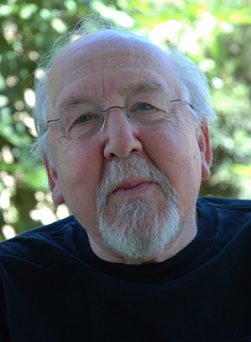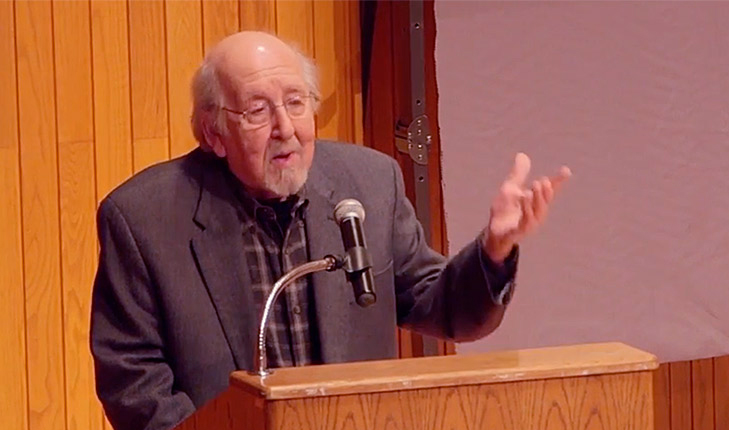Dr. Peter Everwine, a professor emeritus of English at Fresno State and nationally acclaimed poet and translator, died in Fresno on Oct. 28 at the age of 88.
Dr. Everwine’s accomplishments included a National Endowment for the Arts fellowship and a Guggenheim Fellowship for creative arts, both in 1975, and the American Academy of Arts and Letters Award in Literature in 2010.
“As a poet, I can say from the heart that Peter was the best lyric poet writing in America,” said poet C.G. Hanzlicek, a professor emeritus of English and former director of the Fresno State Creative Writing Program. Dr. Everwine taught English literature and creative writing at the University for 29 years.
Many of Dr. Everwine’s poems are revered for their simplicity and clarity of language, often drawing on themes of family and nature.
“To say that he had a way with words is to understate,” Hanzlicek said. “One doesn’t often say of a poem that it is beautiful. That sounds a little old-fashioned. But with Peter’s poems you can’t help saying it about every phrase. His poems unfailingly glisten like moonlight on dew. On top of that, his work is always deeply moving. His passionate voice will be sorely missed by all who loved his poems.”
Dr. Everwine, along with Hanzlicek and their late poet friend and colleague Philip Levine, formed the pillars of what is now the nationally recognized Master of Fine Arts Program in Creative Writing at Fresno State.
Levine, the former United States poet laureate who died in 2015, once wrote that Dr. Everwine’s poems “are like no other in our language. … He presents us with poetry in which each moment is recorded, laid bare and sanctified, which is to say the poems possess a quality one finds only in the greatest poetry.”
Dr. Everwine published seven collections of his own poems: “A Small Clearing” (2016); “Listening Long and Late” (2013); “From the Meadow” (2008); “Figures Made Visible in the Sadness of Time” (2003); “Keeping the Night” (1977); “Collecting the Animals” (1973); and “The Broken Frieze” (1958). He won the 1972 Lamont Poetry Prize for “Collecting the Animals.”
Dr. Everwine was recognized by the Fresno Arts Council with a Horizon Award in 2008, and he was anthologized in Best American Poetry for the poem “Aubade in Autumn” in 2008. He taught as a senior Fulbright lecturer in American poetry at the University of Haifa in Israel, and as a visiting writer at the University of California, Irvine and at Reed College in Portland.
Dr. Everwine also published two collections of poems in translation from the Nahuatl, an Aztec language of central Mexico — “In the House of Light” (1970) and “Working the Song Fields” (2009) — and two collections of poems in translation from the Hebrew of the Israeli poet Natan Zach — “The Static Element” (1982) and “The Countries We Live In” (2011).
Dr. Saúl Jiménez-Sandoval, dean of the College of Arts and Humanities at Fresno State, said Dr. Everwine leaves an admirable literary legacy for the University and for the world. Dr. Everwine’s keen focus on the importance of memory in his works, Jiménez-Sandoval said, “bears fruit in the moments of poetic creation.”
“Peter’s admiration for our human bonds and his respect for nature’s power to unveil the mysteries of life are intertwined with a contemplative quest to find meaning in the flux of existence,” Jiménez-Sandoval said. “His grateful poetic voice reflects his own life. He constructed an intimate space where we all came together as a community of readers — of one other, of the world and of our future.”
 Dr. Everwine was born Feb. 14, 1930 in Detroit, and he grew up in Leechburg, Pennsylvania, about 35 miles northeast of Pittsburgh. His father, J. Merle Everwine, was a doctor, and his mother, Lena Everwine, was a housewife.
Dr. Everwine was born Feb. 14, 1930 in Detroit, and he grew up in Leechburg, Pennsylvania, about 35 miles northeast of Pittsburgh. His father, J. Merle Everwine, was a doctor, and his mother, Lena Everwine, was a housewife.
According to his son, David Everwine, Dr. Everwine was sent to “Army school” around age 15, at the Culver Military Academy in Indiana. He later served in the U.S. Army as part of the Allied Occupation of Germany following World War II.
After his military service, Dr. Everwine earned a bachelor’s degree from Northwestern University and a Ph.D. from the University of Iowa. He taught at Stanford University in 1958-59 after earning the prestigious Wallace Stegner Fellowship, and he then came to teach poetry at Fresno State in 1962. He lived in Fresno for more than 50 years.
Dr. Kathleen Godfrey, chair of the Department of English, said Dr. Everwine’s teaching and poetry has impacted countless writers connected with Fresno State.
“Peter was an integral part of putting our Creative Writing Program on the map,” Godfrey said. “His gorgeous poetry reflects a love for the Central Valley, where he spent the majority of his life. We will miss his gentle humor and passion for the written word.”
For Hanzlicek — who came to teach at Fresno State in 1966, arriving after Levine in 1958 and Everwine in 1962 — Dr. Everwine was, at first, his generous colleague, “but he very quickly became my closest friend for the next 52 years,” he said.
“Peter was a man of many interests,” Hanzlicek said. “Poetry first, of course, but he was also passionate about and a collector of art, and he played a mean banjo. For several years, he played banjo with a group called The String Bandits. He liked to say the group got its name because when people paid them to play it was highway robbery.”
Dr. Everwine’s youngest son, David, also fondly recalled his father’s love for playing banjo and guitar.
“I remember him going to the bars around Centerville and the foothills, taking us to listen,” David Everwine said. “Places like Pierce’s Park, Dotty’s Den, Sweet’s Mill.”
David Everwine said his father’s creative connection with another Fresno State professor emeritus of English, Gene Bluestein, held deep importance to the Everwine family.
Bluestein’s son, Evo, a local musician and educator, recently published the book of interviews, “Road to Sweet’s Mill,” documenting the West Coast’s folk music revival of the 1960s and ’70s. The nonfiction book — which includes an Evo Bluestein conversation with Dr. Everwine — provides a rare glimpse into the region’s rich and varied folk music subcultures that were centered around Sweet’s Mill, the former logging camp in the foothills above Auberry, east of Fresno.
“As musicians, they were famous in their circles in the ’60s and ’70s,” David Everwine said. “So, for me, his poetry felt almost more private than his music.”
Dr. Everwine was an avid outdoorsman and he loved to fly-fish for trout in the Sierras, according to his oldest son, Chris. For many years, Dr. Everwine would hike deep into the backcountry, to a secret fishing camp on the middle fork of the San Joaquin River, far from any marked trail. It was a pilgrimage of sorts that he shared with his sons and a few adventurous friends.
Dr. Everwine has a poetry chapbook forthcoming with Brighton Press, and a full-length poetry collection from a yet-to-be-determined publisher. The family hopes to release the works posthumously.
Dr. Everwine’s survivors include his companion of 29 years, Connie Lake of Visalia; sons Chris of Hendersonville, North Carolina, and David of Fresno; grandchildren Leah of Chicago, and Chase of Costa Mesa; and great granddaughter Ava of Costa Mesa.
Services for Dr. Everwine are scheduled for 11 a.m. on Nov. 10 at Farewell Funeral Services (660 W. Locust Ave. #101) in Fresno.
The family requests that in lieu of flowers, memorial tributes be made to the Fresno State Creative Writing Program in honor of Dr. Everwine. Checks can be made to the Fresno State Foundation, with “Peter Everwine” in the memo, and mailed to 2380 E. Keats Ave., M/S MB99, Fresno, CA 93740. For questions about donations, call the College of Arts and Humanities at 559.278.7082.





